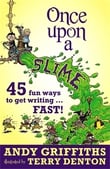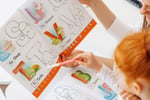
I enjoy writing. My kids don’t (or so they say). Maybe it’s an association with spelling drills and school essay assignments but my boys do not naturally get excited at the prospect of putting pen to paper. Oh, they have friends who keep journals and who write stories at home for fun (imagine!) but not my boys.
Kids can get bogged down focusing on spelling, grammar and neat handwriting and miss all the wonderful reasons and applications for writing:
- communication
- persuasion
- therapy
- entertainment
- information
- presentation
- expression
- manipulation
The school holidays are a wonderful time for getting children to discover the joy and pleasure of writing (while keeping their literacy skills ticking over) without them even noticing! I am a sneaky mum who shamelessly tricks my sons into writing regularly throughout the school holidays … and they think we’re just playing and having fun.
Here are some writing activities you might like to try with your kids:
Fun Home Writing Ideas
- Write lyrics for a song or rap
- Design a comic strip or a spoof newspaper
- Invent a board game – write the rules, design the board/cards/pieces.
- Write a quiz – you know the type: “How adventurous are you?”, “Which One Direction member do you most resemble?”, “What would be your perfect holiday?” – the sort of addictive nonsense Facebook is full of. Teenagers have great fun coming up with the questions, multi-choice answers and crazy conclusions.
- Treasure hunts – Get the kids to write the clues/riddles to take you or their friends to the ‘treasure’.
- Travelogue – Some children love keeping diaries. Many don’t. Mine would find writing a journal laborious and too close to school work. However, we do keep a ‘family travel journal’ when we go on holiday and all contribute ad hoc bits and bobs to a shared scrapbook (from the odd comment or review to pasted-in tickets and brochures). All my family enjoy this collaborative approach and my kids love contributing, even if it’s a simple comment like “Five stars” or “Spoilt by the rain”. I also encourage my eldest to comment in ‘visitor’s books’ in hotels and at museums etc.
- Harness their theatrical side
Get kids to produce their own sketch/play/puppet show/radio advertisement/’cooking show’ and then let them record or perform it. They don’t need to write anything down – maybe just a few cues; it is the story-telling/entertaining skills they are learning here.
My kids make short ‘radio plays’ and can spend hours recording sound effects (did you know that an egg smashing doesn’t actually sound like an egg smashing but water in a plastic bag thrown on a floor does? We do now!). Could you tell a story using only sound effects and no words? How else could you tell a story?
My four-year-old loves presenting demonstration videos about his Transformers (and other toys), which he begs me to upload to youtube. No writing involved but he has to choose his vocabulary and learn how to be informative, entertaining and succinct.
- Parody – anything you can spoof. Kids love copying and impersonating.
My eldest writes cringe-worthy ‘love notes’ from me to my husband and vice-versa and howls with delight as we read out loud the soppy rubbish we are supposed to have written to each other.
I once got a reluctant child to write a thank-you letter to his Grandparents by suggesting he wrote it as a spoilt, rude, nasty child for fun. He managed to zip this off in 10 minutes flat with great relish. The letter was hilarious (and fortunately his grandparents have a sense of humour … although we did include an explanatory note!).
- Play to their ego/competitive side: Some kids are motivated by winning or ‘seeing their name in lights’. See if there are any children’s writing contests they can enter (google ‘children’s writing competitions’) or help older kids set up an online blog. Consider videoing and posting their short presentations or ‘plays’ to youtube – they will love to show their friends their web videos.
- Email friends and family (and get typing practice at the same time!) – it only needs to be a line or two and it’s exciting to receive replies.
- Games
There are countless games you can play with your children to develop story telling skills and build vocabulary, including: - Carry on the story – one person starts telling a story and stops at a crucial moment, allowing the next person to continue the story and so on. Older children can have fun with this by making their ‘cliffhanger’ as fantastical or difficult as possible for the next player to continue from.
- ’A minute to win it’ – Choose a theme (eg ‘household objects’, ‘sports’, ‘famous actors’) and write down a number of them on pieces of paper which are then put in a hat. Players take turns to draw out a piece of paper and describe what is written on it to the other players, without mentioning the actual written word/name. When the word is guessed correctly, the player takes out another piece of paper and starts describing the next word, and so on. They have a minute to get through as many slips of paper as possible before it is the next player’s turn. This game develops vocabulary and descriptive skills.
- Consequences – A classic! Players write the first sentence or two of a story and then fold the paper over to cover what they have written apart from the last few words, which might be something like “and she was surprised to see …”. Players swap their papers and have to continue writing another sentence or two of the story, continuing from the few words visible to them. Then they fold over the paper again and pass to the next player. This continues until the paper is full and in the last round all players should try to conclude that story. Then players may open all the sheets of paper up and be amazed and amused at the resulting narratives.
- Commercial board games – Scrabble (or Junior Scrabble), Boggle, Scattagories etc
Tips
- Provide easy writing opportunities: Wall mounted whiteboards or blackboards in the house are great for families to leave ad-hoc notes to each other (it’s amazing how reluctant writers will willingly scribble a quick message or draw a picture). Magnetic letters on the fridge are great for early readers/writers to practice forming their first words.
- Lead by example – write notes, messages, silly rhymes/poems/songs etc for your kids.
- Read aloud – get your kids to read back what they have written out loud. They will notice their own mistakes and work out how to edit and improve their writing for themselves this way.
- Be your child’s cheerleader. Let the school teachers be the bad guys and pull your kids up for spelling mistakes and dodgy grammar. Writing for fun at home should be just that – the opportunity to enjoy experimenting with words and communication. Encourage and praise and resist the urge to correct.
Spelling and Presentation
While encouraging my children’s love of writing is my primary objective, there are many ways to sneak in presentation and spelling skills too. Here are a few we have tried:
- Lists – shopping lists (I dictate, they write down), ‘what I want to do this holiday’, ‘who I want to invite to my party’ lists – anything where they are encouraged to think, spell and categorise.
- Curate a joke book (this has become something of a family project!)
- Menus – I sometimes tell my kids what we are having for dinner and get them to write/design the menus
- Signatures - practicing writing their names in different styles
- Logo and slogan design
- Typography – let kids play with different font faces and sizes on the computer
- Mirror writing
- Invisible ink writing (see http://www.wikihow.com/Make-an-Invisible-Ink-Message for ideas)

Writing Projects
Many children cannot find enthusiasm for writing unless they see a practical, real life purpose to it. (This is why King’s Project Based Learning is so effective for training children to put their learning into practice.) During the school holidays, I like to throw a small writing project my kids’ way, which they can spend an afternoon on or do in dribs and drabs over a week or two. This is my most successful one:
The ‘Chocolate Bar Project’:
Production
We start by making our own designer chocolate bars by melting down white and milk chocolate and layering in moulds (I use silicon ones) with any fillings of their choice (eg biscuit crumbs, chocolate chips, wafers, nuts, sultanas).
Design and Copywriting
While the chocolate sets, we make and decorate wrappers for our chocolate bars. We give our bar a brand name and come up with a snappy slogan, which we write onto the wrapper. (We also look at commercial chocolate bar packaging and discuss logos, branding and wording)
Marketing and Advertising
We then write a 20 second ad to promote our chocolate and then enjoy a crazy hour or two acting and filming it.
Further Reading
 Once Upon a Slime – 45 fun ways to get writing … FAST!
Once Upon a Slime – 45 fun ways to get writing … FAST!
(© 2013 Pan Macmillan Australia)
Primary school children may enjoy this book by the authors of the popular ‘Treehouse’ book series, Andy Griffiths and Terry Denton. It is “designed to inspire you to have as much fun playing with ideas, words and drawings as Andy and Terry do when they get together to create their crazy cartoons, ridiculous rhymes, silly stories, comic novels and stupid guide books”. I have had lots of fun doing some of the exercises along with my kids.
How do you encourage your child's joy of writing?











